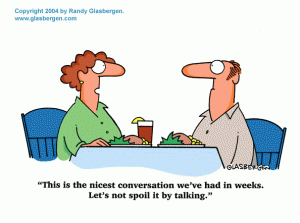"The most important thing in communication is hearing what isn't said."
- Peter Drucker
There are few among us who have not been part of an exchange where the topic of "communication" comes up. Whether it is an organization that is the target of criticism, or a significant other, the message usually appears clear: the message-sharing is deemed subpar. It can be argued that perception vs. reality in some of these cases, but the end result is that people are neither happy, nor satisfied, with the exchange of information.
Nearly as fatal to effective relationships between parties is the illusion by one, or more, of the parties that the appropriate exchange/sharing of information has taken place when in reality it has not, at least to the satisfaction of all involved in the intended exchange.
"The single biggest problem in communication
is the illusion that it has taken place."
- George Bernard Shaw

One approach to addressing the disconnect between those attempting to "communicate" with each other is developing the skills necessary to enter into conversation with another. Too often the diagrammatic "sender" - "receiver" communication model is dominant in interpersonal exchanges. Although in its simplicity this basic model lulls one into believing that utilizing it leads to both efficiency and effectiveness of sharing information, it rarely meets the emotional needs of participating individuals. "Objective" intercourse between people may be hailed for its Spartan economy, but in reality the austerity it engenders frequently creates an emotional void which usually, in the end, exacts a deficit in terms of an effective and lasting outcome.
Although not occurring often enough, one frequently encounters someone who is said to be a "good communicator." Those with a frugal approach to the examination of what makes a "good communicator" will often state that the core attribute of a good communicator is being a good/active listener. Although active listening skills are an essential element of good communications, being able to respond to the other party's input appropriately is believed to be just as essential. Outside of Freudian "free association" counseling, most people want to feel "engaged" with the other party(ies), which is best accomplished through effective conversations. Conversation moves communication into a more subjective, personalized, activity and strengthens the bond between speaker and receiver.

"Conversations are efforts toward good relations. They are an elementary form of reciprocity. They are the exercise of our love for each other. They are the enemies of our loneliness, our doubt, our anxiety, our tendencies to abdicate. To continue to be in good conversation over our enormous and terrifying problems is to be calling out to each other in the night. If we attend with imagination and devotion to our conversations, we will find what we need; and someone among us will act—it does not matter whom—and we will survive." - Barry Lopez




No comments:
Post a Comment